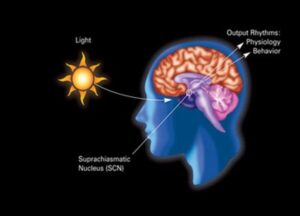
When we think about hormones and natural cycles, we often focus on women’s monthly infradian rhythms—but men have a daily hormonal cycle that plays a crucial role in supporting energy, mood, metabolism, and vitality. From a naturopathic perspective, honouring this natural rhythm is key to supporting men's health and well-being. Let’s discuss the reproductive and circadian hormones and 10 key strategies backed by science that can support a healthy daily, "diurnal" hormonal cycle and circadian rhythm in men.

The Hidden Rhythm of Men’s Health
Sometimes, in the conversation about hormones, men’s hormonal health can get lost in all the talk about “oestrogen dominance,” premenstrual issues, and monthly periods. Men do not have a monthly reproductive hormone cycle, but they do experience a daily hormonal cycle, primarily involving testosterone fluctuations, but also involving all the same reproductive and circadian hormones as women—yes, even progesterone and oestradiol! This daily cycle can affect things like muscular health, libido, energy levels, bone, cardiovascular, and brain health, and overall well-being. Some experts and researchers acknowledge that the reproductive hormone fluctuations and biological rhythms that men experience can even impact mood and behaviour.
What is a Biological Rhythm?

There are 4 types of biological rhythms—circadian (24 hours), diurnal (daily), Ultradian (short periods at high frequencies), and infradian (longer than 24 hours, e.g., the menstrual cycle). These biological rhythms support life and the timing of everything required for an organism’s biology to run itself. Disruptions to these rhythms, particularly the diurnal and circadian, have been shown to be detrimental to many facets of animal and human health.
The bulk of the organisms on Earth respond on a hormonal level to changes in their light, seasonal, thermal, sleep, and feeding/fasting environments. The machinery for this biological patterning is in the bulk of our cells but the conductor of the symphony in humans and most vertebrates (animals with a spine) is the suprachiasmatic nucleus (SCN) in the hypothalamus, which is located in the brain. Circadian and diurnal hormones themselves act as circadian drivers, but in humans and animals, the light/dark cycle is the most obvious zeitgeiber (time giver). The circadian and diurnal rhythms keep us aligned with the Earth and sun. Humans are diurnal creatures, which means we are awake during the day.
The Daily Dance of the Male Hormones
Testosterone, the primary male sex hormone, follows a diurnal pattern, peaking in the early morning and gradually declining throughout the day. This natural rhythm supports motivation, physical performance, and libido, particularly in the morning hours. Testosterone plays a crucial role in supporting the development of male characteristics and overall health. It supports bone and muscle strength, fat distribution, facial and body hair growth, red blood cell production, and sexual function. Testosterone also supports healthy energy levels, mood, and brain function.
As the day progresses, cortisol, a steroid hormone that supports wakefulness and metabolism, tapers off, while melatonin gradually increases, preparing to support the body to sleep and recover. Other hormones such as leptin, ghrelin, growth hormone, and thyroid are also involved in regulating the internal 24-hour clock that governs sleep, hormone production, digestion, and cellular repair. Hormones like dopamine and serotonin are in turn supported by a healthy circadian cycle and the other biological rhythms.
Oestrogens and Progesterone in Men
Men and women produce the same reproductive hormones, but their production sites, tissue and blood concentrations, and interactions with organ systems or genes are different. Pregnenolone is the precursor to all steroid/reproductive hormones, via progesterone, which is produced daily. Men’s progesterone levels are similar to women’s in the first half of their monthly cycle, but in males it doesn’t affect gene expression. Progesterone supports sperm production, libido, healthy blood sugar and bones, brain health, lean muscle mass, thyroid hormone, mood, and sleep. More importantly, healthy levels of progesterone support healthy levels of oestrogens.
In men, the oestrogens are produced through the conversion of androgens like testosterone by an enzyme called aromatase. This conversion process happens in various tissues, including the testes, fat tissue, and brain. Men experience daily variations in oestrogens, with levels typically higher in the morning and lower in the evening, and these fluctuations are generally less pronounced and have less impact compared to women. Oestrogens are vital for supporting a healthy hormone balance, libido, erectile function, and sperm production, but levels that are too high have negative consequences for long-term men’s health.
Circadian and Hormonal Disruptors
 Things that can throw off your natural daily rhythms:
Things that can throw off your natural daily rhythms:
- Artificial light and screen exposure at night
- Lack of daily exposure to sunlight, especially infrared and bright light
- Irregular sleep patterns and poor sleeping environment
- Stress, particularly emotional
- Dysfunctional metabolism
- Poor diet and meal-timing—ultra processed and refined; eating irregularly, late at night, or skipping meals.
- Alcohol and too much caffeine
- Shiftwork
- Certain medications or health conditions
- Plastics and environmental toxins
- Lack of social connections and support
Supporting Hormonal Rhythms Naturally—10 Key, Science-Backed Strategies

- Natural light exposure
Getting up and outside at sunrise and then being outside as much as possible during the day (weather permitting; practicing safe sun exposure) is essential to support circadian and hormonal health, especially progesterone and testosterone production. Eating during daylight hours under natural light is also helpful.
- Diet
Eating breakfast is an important circadian “signal.” So is eating at the same time every day and eating the appropriate amount for your body and activity. Plus, the prioritising of nutrient-dense, quality animal proteins and healthy fats (this includes animal fats and collagen), seasonal carbohydrates like fruits and tubers, and traditional foods, lays the foundation for circadian rhythm balance. While Keto or carnivore can be useful short-term for metabolic dysfunction and brain health, carbs support thyroid function, reproductive hormones, and circadian health in the long-term.
- Limit xenoestrogens and phytoestrogens
Xenoestrogens, found in plastics, and phytoestogens, found in beans like soy, are compounds that mimic oestrogen in the body. These exogenous (produced outside the body), oestrogen-like compounds can upset the natural balance of men’s hormones.
- Cellular energy production
Efficient cellular energy production (mitochondrial function) is at the heart of supporting circadian hormone balance and whole-body wellness. For additional support, look to things like Coenzyme Q10, Lipoic acid, Carnitine, B vitamins, Vitamin E, Magnesium, Creatine, NMN, Pyrroloquinoline quinone, Zinc, Selenium, Antioxidants, Arginine, and Vitamin C.
- Meditation
Chronic stress can disrupt the circadian rhythm. Incorporating relaxation techniques like meditation, deep breathing, or mindfulness support balanced hormones, metabolism, and overall wellbeing. Finding time to unwind is an important part of any men’s health routine.
- Morning movement
Resistance training and other exercise, especially in the early part of the day, supports testosterone production and metabolic health. Lean muscle mass is now considered to be a supporter of health and lifespan.
- Sleep hygiene
Deep, restful sleep supports testosterone and growth hormone production overnight, among other well-known benefits. Forget those late nights with Netflix—they’re not doing you any favours. Definitely have a social life, but in general, get to sleep early and rise with the sun. Being “in rhythm” supports sound sleep, and sound sleep, in turn, supports circadian and hormonal health.
- Herbal support
There are many, but examples are herbs like ashwagandha, rhodiola, and ginseng, which may support stamina and stress resilience. Ayurveda considers ashwagandha a circadian rhythm supporter. Saw palmetto and maca may support hormones and prostate health. Ginkgo and hawthorn can support circulation and heart and sexual function, as can cordyceps. Lion’s mane can support brain health.
- Microbiome balance
A balanced gut microbiome supports gut health, digestion, nutrient absorption, and immune health, which flows on to supporting overall wellbeing, including hormonal balance and circadian health. Microbes also respond to light, heat, etc., cues from the environment. Fermented foods and pro-, pre-, and postbiotics can support microbiome balance, as can the other strategies mentioned here.
- Social connection and health checkups
While not specifically a circadian factor, supportive networks are vital for men’s well-being. Social isolation is a big one for men these days and is impacting their mental and physical health. Make it a priority to have social hobbies, join community groups, and/or spend time with friends and family. Men tend to wait much longer than women to see a health professional when issues arise—try not to delay seeking help or simply make time for regular sessions with a trusted practitioner.

Aligning With Nature for Men’s Health and Vitality
When we live in tune with nature’s rhythms, we can create a foundation for long-term health and vitality. True wellness isn’t about quick fixes—it’s about restoring harmony between our internal environment and the world around us. This includes listening to the cues your body gives you and working with the natural light and dark cycles of the Earth: waking with natural light and spending time outside in nature, eating with intention, moving regularly and supporting healthy muscles, connecting with others, and prioritising rest and reducing screen time when the sun sets. These simple, consistent actions support not only testosterone and hormonal balance and energy levels, but also mental clarity, metabolic health, mood and emotional resilience, and immune function.
In essence, vitality isn’t something to chase—it’s something we cultivate by living in alignment with how we’re biologically designed to function. When men prioritise their health in this way, the result is not just the supporting of hormonal balance, but a deeper sense of energy, purpose, and connection.
See your natural health practitioner for more personalised nutritional, lifestyle, and herbal support.
